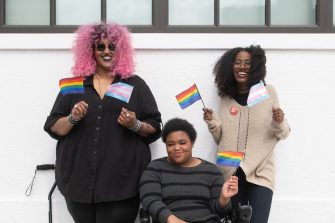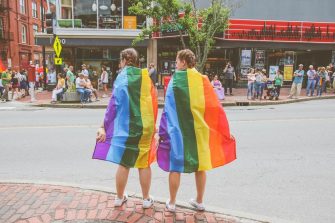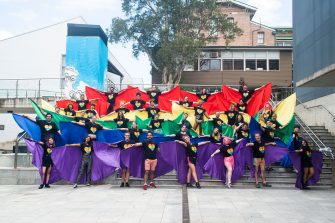LGBTQIA+ inclusive language & pronouns
Language matters and using appropriate terminology allows people to feel included.
UNSW uses the acronym LGBTQIA+ as the inclusive umbrella that recognises the most common categories within gender and sexuality diverse populations, and people with innate variations of sex characteristics: lesbian, gay, bisexual, transgender, queer-identifying people, intersex and asexual, with the '+' being an inclusive and intentional way of representing all identities and experiences that are not represented by the letters.
We acknowledge there are many other variations of this acronym, which carry many problems and reason for debate – and, no doubt, it's likely there will be new variations in the years to come. We realise that our choice may not reflect the preferred identification of all individuals and will continue to discuss with the LGBTQIA+ community which initialism conveys the greatest sense of belonging for everyone.
Inclusive language & pronouns guides
- Diversity Council Australia's Words at Work.
- ACON's Language Guide for Trans and Gender Diverse Inclusion for details on how to use inclusive and non-offensive language.
- ACON’s Pronouns 101
- TransHub on Pronouns - Different Types and How to Use Them
- Wear It Purple's Guide to Misgendering & Pronouns.
This video guide to pronouns from Minus18, an Australian NGO championing LGBTQIA+ youth, explains the importance of pronouns.
Pronouns at UNSW
Pronouns are used to refer to people when we are not using their name. Using the correct pronoun shows respect. In the English language, pronouns often indicate gender. For many trans and gender diverse people, using the correct pronouns is an important and validating part of their gender affirmation. Some trans and gender diverse people may use gender-neutral pronouns, rather than binary male-female pronouns.
This video guide to pronouns from Minus18, an Australian NGO championing LGBTIQ+ youth, explains the importance of pronouns.
UNSW encourages staff and students to include their pronouns in their email signatures.
-
Name (she/her)
TitleDivision of Equity, Diversity and Inclusion
Lower Ground, Chancellery
UNSW Sydney
NSW 2052 AUSTRALIA
E: name@unsw.edu.au W: www.unsw.edu.au -
It is also possible now to display your pronouns on Microsoft Teams and Outlook.
- Restart Teams (by quitting and reopening the application) and Outlook.
- Open your profile card. In Teams, do this by selecting your profile picture in the upper right corner and then selecting your name/email address. In Outlook, open Outlook on the web and select your name or profile picture within Outlook Mail or Calendar.
- On your profile card, select “+ Pronouns” or the pronouns listed below your name.
- The “Add your pronouns” window will appear. To add or change your pronouns, select from the examples (only available in English), or enter your own. To delete, remove your pronouns.
Note: the pronouns feature is only available via Outlook on the web at this time.
Tips on using names and pronouns
-
Irrespective of whether there are trans of gender diverse people present, display your name and pronouns. For example:
- on your desk plaque
- on the corner of a whiteboard when presenting
- in your email signature
- on Zoom and Teams and other digital platforms.
-
The easiest way to ask someone about their pronouns is to share your own. By opening the conversation with your pronouns, you are normalising the act of sharing of pronouns in public spaces and interactions.
Example: "Hello, my name is Charlie and I go by 'she, her, hers' pronouns. What pronouns do you use?" OR "How would you like me to refer to you?"
-
If a staff member or student shares their gender identity with you, do not share it with others unless you have their expressed permission.
-
Acknowledge when you have made a mistake about someone's pronouns and correct yourself.
Unlearning gender socialisation takes time, and you are bound to make mistakes. Model the behaviour you expect.
Example: "Oh, she's a great friend. I'm sorry, I meant they are a great friend. They always send me funny videos to cheer me up."
-
Honouring staff and student names and pronouns includes making sure that other people also use the correct names and pronouns. If someone else misgenders and staff member or student, politely provide a correction whether the person is present or not.
Example: Someone says, "Oh, she's a great friend." Your response can be, "You're right, they are a great friend. Also, just so you know, Sam uses 'they/them/theirs' pronouns."



